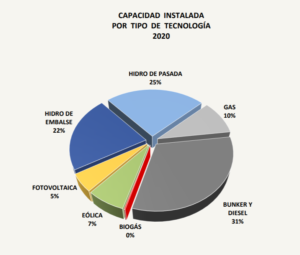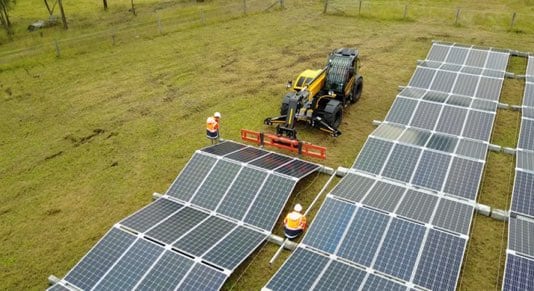Commitments that Panama acquired in the Paris Agreements are contained in what is known as the National Determined Contributions.
These are ethical commitments, not mandatory, that do not imply sanctions for non-compliance.
The commitments of the Republic of Panama in this regard are to generate 30% of electricity by 2050 with new renewable sources (solar and wind).
It is important to differentiate between installed power and effective generation.
In 2017, while solar and wind capacity reached almost 12%, their generation represented only 6%.
Currently Panama has an installed capacity of 270 MW of wind, 194 MW of solar parks, and 35 MW of solar in autoconsumption condition.
Penetration of solar energy remains low. Towards the end of 2019 it only represented 2% of total generation matrix.
In the first quarter of 2020, the total generation was 2,842,636 kWh; 256,638 kWh of them came from wind, that is, 9%, while 91,293 kWh from photovoltaic means 3.2%.
If to this is added the 1,181,553 kWh accounted for by hydro (41.5%), it is obtained that energies not based on fossil fuels represented 53.7% during the first quarter of 2020.
Compared to the same period of 2019, total renewables increased their generation by 18%.

With an investment of about 160 million dollars, the 150 MW Penonomé Photovoltaic Solar Plant is considered the largest solar installation in Central America.
Panama will be a pioneer in the implementation of a modern solar energy system called “Maverick”.
It is a revolutionary pre-built and pre-wired solar solution that folds up, ships to site, and then deploys. It is one of the easiest and fastest ways to add solar resources, using fewer tracts of land.
Panama will be one of the first countries where this technology will be implemented in a 2 MW fast track project.
The innovative solution enables customers to install solar projects at a rate three times faster, while supplying up to two times more energy using the same terrain as traditional solar installations.
The pre-manufactured modules are deployed from a moving vehicle that places them in a certain area.

Large local companies have shown a growing interest in the use of solar energy for their electricity supply given the change in mentality of Panamanians who are showing concern about climate change and from there they have already achieved the signing of several agreements of power sales (PPAs) with large long-term clients for at least 22 years.
As in most countries, it is committed to centralization and large-scale projects and not to empower users and democratize energy.
The role of the prosumer should be promoted and distributed generation policies developed.
The Office for Latin America and the Caribbean of the UN Program for the Environment (UNEP) together with the Spanish Agency for International Development Cooperation (AECID) launched the Generación SOLE initiative, which seeks to promote innovative financing models for deployment of photovoltaic solar generation distributed in the region with immediate actions in Panama.
The Generación SOLE initiative seeks to strengthen the capacities of commercial banks to create financing options aimed at the final consumer, whether residential, commercial or industrial. The initiative aims to promote disruptive growth in the solar generation market.
All you need is Sun. All you need is Sopelia.
